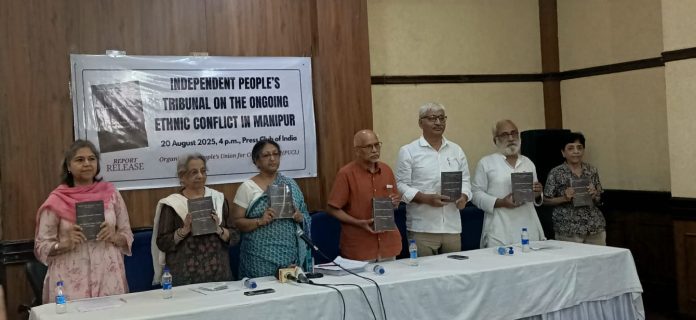– Mohd Naushad Khan
New Delhi: An Independent People’s Tribunal on the ethnic conflict in Manipur released its findings at the Press Club of India on Wednesday. The report exposed failures of state institutions, the judiciary, and the media in dealing with one of India’s worst humanitarian crises in recent years.
Justice Anjana Prakash, former judge of the Patna High Court, said Manipur is in a “deep crisis of justice.” She revealed that during peak violence, filing habeas corpus petitions was almost impossible. Typists and lawyers were absent, and registries often rejected petitions. This, she said, meant denial of fundamental rights. Justice Prakash demanded a High Court bench in hill districts for equal access.
She criticised judicial inaction. The Supreme Court acted only after visuals of women paraded naked went viral, even though violations had continued for months. Over 7,000 FIRs have been filed, but progress remains unclear. Victims, witnesses, and lawyers face threats. Justice Prakash urged online depositions, pro bono legal help, and witness protection to restore faith.
Professor Apoorvanand highlighted media failure. He said national and local outlets abandoned ethics and spread propaganda, misinformation, and hate. Instead of questioning power, they amplified it. He accused the media of demonising communities and spreading fear. “Except for a few journalists, the media has worked as an instrument of hate,” he said, recalling Gujarat 2002 and Muzaffarnagar 2013.
Sandeep Pandey, General Secretary of the Socialist Party (India), spoke on governance. He called for more Muslim representation in public institutions. He warned that low representation deepens socio-economic backwardness. Citing the Sachar Committee, he urged Muslim youth to seek roles in state commissions and staff selection bodies, not just UPSC. He stressed long-term institutional change.
The Tribunal released wide recommendations.
For women and survivors: inter-community safe spaces, livelihood support, confidential counselling, and action against negligent police officers.
On justice: High Court bench in hill districts, Supreme Court-monitored SIT from outside Manipur, fast-track courts, and witness protection.
On rehabilitation: camp-based support, livelihood training, education, psychosocial care, and independent review of relief.
On health: mobile medical teams, culturally sensitive mental health services, and dedicated funds for hill-district health systems.
On governance and peace: stop demonising communities as “illegal immigrants,” adopt a national refugee policy, set up a judicially mandated rehabilitation committee, suspend land/forest notifications, and form District Peacebuilding Task Forces.
Speakers included Prof. Virginius Xaxa, Navsharan Singh, Tanveer Fazal, and Brinelle D’Souza. They discussed Manipur’s constitutional status, the timeline of violence, root causes, and the health and mental needs of survivors.
The report concluded that peace in Manipur needs more than relief and accountability. It requires governance reforms, responsible media, and transitional justice to heal ethnic divides.




